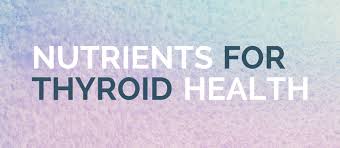|
The Thyroid is a very important little gland in the human body and chances are you have heard about it from time to time. This popular little gland makes the news quite a lot considering it's major function in our metabolism. Not only do you hear about it in the health and weight-loss news, but also quite a lot in the avenue of moods, depression, etc. What do you really know about the thyroid though? It's so easy for one to assume that they might be hypothyroid because they have a hard time losing weight, are depressed, and possibly fatigued. Before jumping into the WebMD self diagnosed world, I'm here to offer a little more info on that important gland and what it does for us. Thyroid Physiology: The Thyroid gland produces 2 hormones: T3 (triiodothyronine) and T4 (thyroxine).The thyroid hormones act on nearly every cell in the body. They act to increase the basal metabolic rate, affect protein synthesis, help regulate long bone growth (synergy with growth hormone) and neural maturation, and increase the body's sensitivity to catecholamines (such as adrenaline) by permissiveness. The thyroid hormones are essential to proper development and differentiation of all cells of the human body. These hormones also regulate protein, fat, and carbohydrate metabolism, affecting how human cells use energetic compounds. They also stimulate vitamin metabolism. Numerous physiological and pathological stimuli influence thyroid hormone synthesis. As you have just read, that small little gland in your neck has a pretty big job. When the thyroid starts to malfunction, you get one of two outcomes, HYPOthyroidism or HYPERthryoidism. Hypothyroidism Insufficient hormone production from the thyroid gland.
Incidence Diagnosed: 3% of the population (9.3 million in the US). Most common in women over 35 (>20% of US menopausal women are diagnosed with thyroid dysfunction. Blood Test Analysis: High TSH (thryoid stimulating hormone), Low Free T3, High or Low Free T4 Hair Analysis: High Calcium : Potassium ratio ***************Don't worry, I'm coming back to explain everything in more detail shortly******************* Hyperthyroidism Overactive thyroid hormone secretion.
Incidence Approximently 1.3 percent of the population. This increases to 4 to 5 percent in older women. Hyperthyroidism is more common in those whom smoke. Graves disease is often found in younger women. Blood Tests Analysis Low TSH, High free T3, Normal to High T4 Hair Analysis: Low Calcium : Potassium Ratio Making Sense of the Thyroid Gland Function Almost 90 percent of the hormone produced by your thyroid is in the form of T4, the inactive form. Your liver then converts the T4 into T3, the active form. If everything is working properly, you will make what you need and have the correct amounts of T3 and T4, which control the metabolism of every cell in your body. If your T3 is inadequate, either by scarce production or not converting properly from T4, your whole system suffers. T3 is critically important because it tells the nucleus of your cells to send messages to your DNA to rev up your metabolism by burning fat. This is how T3 lowers cholesterol levels, regrows hair, and helps keep you lean. Your T3 levels can be disrupted by nutritional imbalances, toxins, allergens, infections, and stress, and this lead to a series of complications, including thyroid cancer, hypothyroidism, and hyperthyroidism, which today are three of the most prevalent thyroid-related diseases. Today we are seeing far more HYPOthyroid related health problems due to the nature of our lifestyles. The number 1 PRIMARY cause of an under-active thyroid gland is due to Iodine deficiency. Iodine is deficient in our food supply, but equally deficient because of our bodies inability to absorb the iodine effectively. The most common factors contributing to decreased thyroid function include food sensitivities, Stress, soy, and bromines. Obviously we are all different and have different sensitivities, but any one food sensitivity that causes inflammation and an immune response can hurt your thyroid function. I am not even going to go into the nastiness of SOY! Just know that it is BAD BAD BAD, especially the nonfermented soy products like soy "meat" , cheese, and milk. If you want to read up more on soy, simply google soy on the internet along with unhealthy benefits of soy. Soy and the thyroid specifically: soy phytoestrogens are significant anti-thyroid agents that cause hypothyroidism. Bromine, and element found in A LOT of things we eat and come into contact with daily such as pesticides, few bakery goods/flours, some soft drinks, vegetable oils, some medications, and some fire retardant products and hot tub water treatment. Bromine can take the place of iodine in our receptor cells thus not allowing iodine into the thyroid. Bromine toxicity can lead to psychiatric problems along with decreased thyroid health and many other health concerns. Lastly and I think is a massive contributor to thyroid health is STRESS! If you have studied health and stress even a little, you know that stress is an adrenal killer. The Thyroid and Adrenals are vital to each other and desperately need to work in harmony to keep our hormones balanced. Many of us are under chronic stress, which results in increased adrenaline and cortisol levels, and elevated cortisol has a negative impact on thyroid function. Thyroid hormone levels drop during stressful times, which is when you actually need it the most. When stress becomes chronic, the flood of stress chemicals – adrenaline and cortisol – produced by your adrenal glands interfere with your thyroid hormones, causing a whole gamut of health-related issues like obesity, high blood pressure, high cholesterol, and/or unstable blood sugar levels. A prolonged stress response can lead to adrenal exhaustion, which is also known as adrenal fatigue and which is often found alongside thyroid disease.
Lets revert back to the iodine sources in our food supply briefly. The biggest contributors to decreased iodine consumption today include: diets focusing less on fish and seaweed, vegan/vegetarian diets, less iodide in the food and agricultural industry, fluoridated drinking water, food contamination, and decreased use of iodized salt. What we can do to make healthier changes daily; eat organic as much as possible, avoid eating or drinking from plastic containers and choose glass or ceramic instead, look for organic whole grain bread flours that are "bromine -free", and avoid sodas. Outside of our dietary changes, steer away from Bromine in your hot tubs, read labels on your daily personal care products to avoid harsh chemicals, and try to ventilate with as much fresh air as possible as often as you can. Two Main Points to Thyroid Care
Tyrosine is the basis for thyroid hormones and the three catecholamines: epinephrine, norepinephrine, and dopamine. Great sources of Tyrosine are eggs, raw cheese, raw milk, raw almonds, avocado, grass fed beef, and organic chicken and turkey. Key Supplementation for above: Vitamin C, Vitamin F, and Tyrosine
Simply ask us at the office about a few of the products we carry, or just feel free to ask more questions about Thyroid health in general.
0 Comments
|
AuthorsDr. MJ Wegmann, Archives
July 2023
Categories
All
|



 RSS Feed
RSS Feed